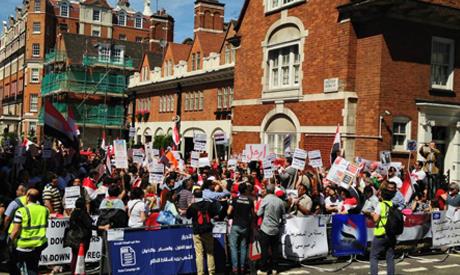
File photo: Egyptians are protesting against the Muslim Brotherhood outside the country s embassy in London
Following the death of the London-based acting Supreme Guide Ibrahim Munir last year, former secretary general of the group Mahmoud Hussein, who resides in Istanbul, went on to claim the position. But the London faction of the group had already put forward another veteran figure, Salah Abdel-Haq, as acting guide.
The two factions traded accusations of dividing the group and breaching its organisational rules. But it seems the London faction is quietly reorganising itself in Egypt as well as reshuffling the International Organisation while the Hussein-led Istanbul faction is losing ground in the leadership race.
Many factors have helped the UK segment of the MB to dominate, but the most important is Munir’s legacy of mending fences with the British authorities. The UK government reviewed the group a few years ago after calls by some Arab countries to designate it a terrorist organisation. The review was inconclusive which reinforced the accusation of “London harbouring terrorists to use them as leverage in British-Arab relations”.
After a failed attempt by the group to rise to power in some Arab countries following the 2011 popular protests, Turkey became a hub for its leaders and members who fled the region. London briefly lost its position as the main centre of the group outside the Middle East. Tunisian figure Rached Ghannouchi, who assumed leadership of the International Organisation, would attend meetings in Istanbul while maintaining his home in London where he has lived for decades.
In the last two years, as Turkish President Recep Tayyib Erdogan sought reconciliation with oil-rich Gulf countries his support for the MB started to falter somewhat. Saudi Arabia and the United Arab Emirates predicated the input of billions of dollars into the ailing Turkish economy on Turkey’s disengagement with the group.
Second-tier leaders of the group, dominated by Egyptian “middle-management” figures, have worked on restoring the role of London leadership. Though the Palestinian and Syrian components of the group’s international body are more active in Europe, the Egyptian component retains the biggest clout. Figures like Mohyi Al-Zayat, Mohamed Al-Beheiri, Abdel-Moneim Al-Barbari and Helmi Al-Gazzar were instrumental in choosing Abdel-Haq as acting guide. As an almost unknown figure, Abdel-Haq should help the group to reorganise quietly and in the meantime repair its international relations which have been strained in the past few years. Al-Gazzar and his colleagues might find this an effective way to lead the group from behind the scenes, as some of their confidantes have hinted they might.
The relatively young leaders see London as the best suited place to work from to reorganise their bases in the region. Money is a vital piece of the puzzle, and the UK provides an even better hub for financial dealings than Istanbul. According to a paper published this month by the European Centre for Counterterrorism and Intelligence Studies of Germany and the Netherlands, the group has investments in Europe that amount to 10 billion dollars. Besides finance and communication, the UK holds significance for its traditional and historical links to the group. As an MB-affiliate in London suggested, “governments (in UK) come and go, but British interests in the region remain the same and the group can always help.”
For the British authorities, the group is seen in the same way as other opposition factions exiled there. It is likely the security agencies are the main institutions overseeing such groups and their activities. Speaking on condition of anonymity, sources from those agencies maintain the usual rhetoric: “We keep links to all parties, this helps with our diplomacy and to serve our interests.” They deny the claim that the UK is using such groups as a pressure tool to further its political or economic ends. Though politicians can use all the leverage at their disposal, agencies are more concerned about national security – that is the mandate as they see it: “condoning militancy or creating chaos is not among the tools, since it has wider implications that can harm national security.”
If groups exploit the laws and rules of the UK or any other country, “this is a matter for the system as a whole, and not only security organisations.” Using national security to curb activities the UK considers lawful is apparently not on the cards.
Responding to accusations by some Arab countries, these sources say that the authorities sometimes receive information from foreign partners about a potential threat taking shape here. These are taken seriously, but they are investigated through the usual, open channels.
Some doubt that the MB “will be happy to move from Istanbul,” as Andrew Hammond, who teaches Ottoman history at Oxford University, told Al Ahram Weekly: “Qatar could have a role in this decision, though it looks like the UK is trying to get leverage with regional governments. This also has a history, of course. London has long been a city of Arab exiles.”
Observing British-Arab relations in the next few months will show whether the MB are being used as leverage by the UK, especially when it comes to doing business with Gulf countries. That would help support the group’s deceitful claim that it is a political player and not a terrorist organisation.
* A version of this article appears in print in the 1 June, 2023 edition of Al-Ahram Weekly
Short link: